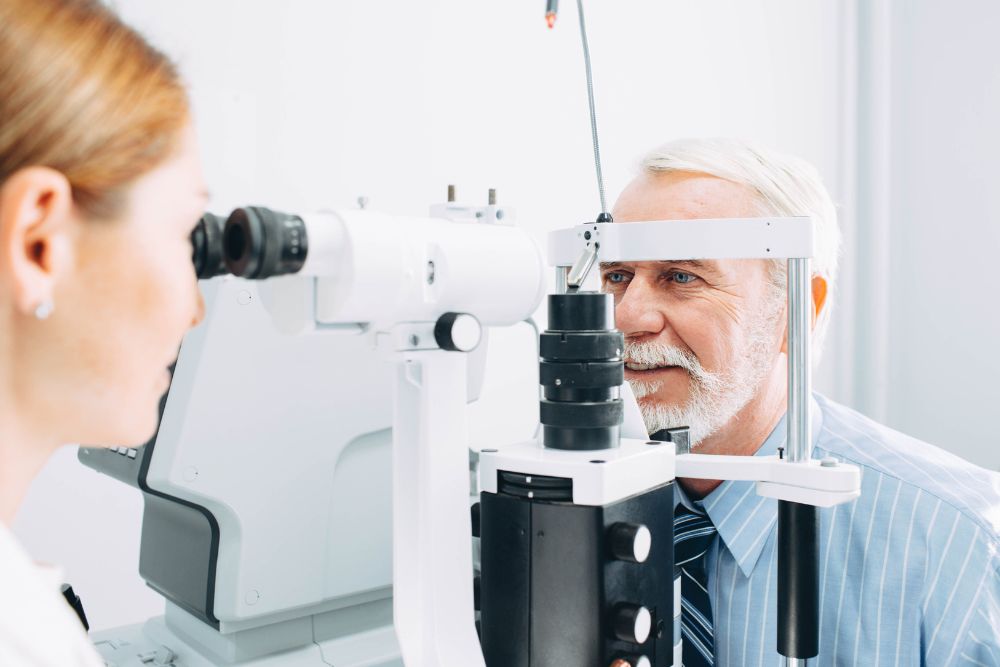The Latest in Retina: Syfovre is now FDA-Approved for Geographic Atrophy
Some retinal conditions have few, if any treatments, other than monitoring. So when a positive breakthrough occurs, it’s a cause for celebration! Recently, the U.S. Food and Drug Administration (FDA) approved the first and only treatment for geographic atrophy. A serious, advanced stage of dry age-related macular degeneration (AMD), geographic atrophy is one of the leading causes of blindness worldwide. However, a pegcetacoplan injection known as Syfovre™ was found to be safe and effective for geographic atrophy. It is expected to be available to patients in early March.
An Overview of Geographic Atrophy
In its later stages, dry AMD may progress into geographic atrophy. This condition involves lesions developing and targeting the retinal pigment epithelium (RPE), tissue within the eye essential to the retina’s metabolic processes. With dry AMD, drusen (small, yellow deposits) accumulate under the retina, causing the RPE cells to die and inhibiting their functionality. This results in the death of the retina’s light-sensitive photoreceptor cells, which convert light signals into neural impulses. The death of these cells can lead to a loss of central vision, which is the type of vision that is responsible for close-up activities such as reading.
This condition’s cause is unknown, but certain dry AMD risk factors may contribute. These include being 50 years or older, having a family history of AMD, smoking, obesity, unprotected sunlight exposure, and underlying chronic conditions, like diabetes. It worsens over time, on average, taking about 2.5 years for lesions to start affecting central vision. Other common symptoms include:
- Difficulties seeing in low light
- Colors appearing dull or washed-out
- Reduced visual acuity (sharpness and clarity)
- Scotomas – blind spots in or near the central vision field
- Permanent vision loss
Why Is the FDA Approval of Syfovre™ So Important?
Up until now, there’s been no approved treatment for geographic atrophy, which affects more than one million Americans. This FDA approval makes it the first and only treatment available to patients, marking a true milestone in the field of retinal ophthalmology. Syfovre™ was found to effectively slow the growth of lesions, with its effects increasing over time. The greatest benefit — up to a 36% reduction in lesion growth — occurred between the 18th and 24th months.
What Does This Treatment Involve?
Administered via an injection in the eye, Syfovre™ works by targeting a protein in the complement pathway, part of the immune system. Patients and physicians are provided with dosing flexibility, allowing this medication to be administered every 25-60 days. However, Syfovre™ does not treat early dry AMD and, unlike anti-vascular endothelial growth factor (anti-VEGF) medications for wet AMD, it does not completely stop geographic atrophy progression.
Syfovre™ underwent two extensive clinical trials, and it was found to be safe. Less than 5% of patients reported the most common adverse reactions, including discomfort, hemorrhage (excessive bleeding), floaters, and neovascular (also called wet or exudative) AMD, the more severe form.
"GA is a devastating disease process that robs millions of their central vision. We have watched these patients go blind for far too long. Along this road we have not remained idle. Together as Houston+San Antonio+Austin, and now unified as RCTX, we have struggled and fought for our patients’ vision every step of the way. We have enrolled dozens of clinical trials searching for an effective treatment.
But today the world is different, brighter for all GA patients.
February 16th, for the first time, we can now definitively state that we have a treatment for GA. This is the most important event in retina in a decade.
And we are here because of YOU. Patience, attention to detail and a willingness to never give up, never quit, got us here. Thank you.
We will be using this drug in clinic as soon as it is commercially available in early March.
And, our work is not done! Now that we have one treatment, we will continue pursuing even better treatments for our patients with AMD and GA.
Thank you and we look forward to continued successes together!!!"
-- Dr. Charles C. Wykoff
Learn If You May Benefit From Syfovre In a Consultation in Texas
This FDA approval represents a major achievement for patients with geographic atrophy, a serious condition that worsens over time. To determine if you qualify for Syfovre™ or if you have any questions, we encourage you to schedule an appointment with Retina Consultants of Texas.







